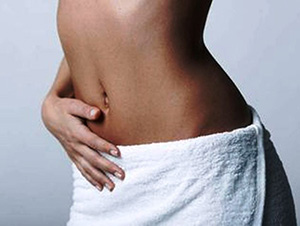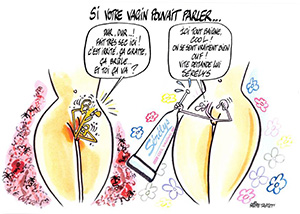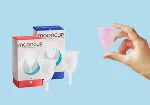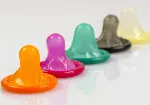Intimate or vaginal dryness

Vaginal dryness is a lack of lubrication in the vagina that results in irritation, burning, itching, bleeding, tingling, or discomfort during intercourse. Far from being unknown, 1 in 6 women suffers from vaginal dryness at least once in their life. Often linked to menopause or childbirth, vaginal dryness can also come from various factors.
The consequences of intimate dryness can be important: dyspareunia (= painful penetration) or even vaginismus: the contraction of the vagina that makes the sexual act impossible. If these repeated pains do not happen so far, they cause most of the time a drop in libido, self-confidence and sometimes tensions within the couple.
Where do vaginal secretions come from and what are they for?
 Vaginal secretions come from glands that are located at the entrance to the vulva and the cervix. In the cervix, the glands secrete every day a liquid "viscous" that serves to rid the vagina of dead cells and other impurities or germs.
Vaginal secretions come from glands that are located at the entrance to the vulva and the cervix. In the cervix, the glands secrete every day a liquid "viscous" that serves to rid the vagina of dead cells and other impurities or germs.
Vaginal secretions form, so to speak, a self-cleaning system of the uterus and vagina (dead cells ...). In the vulva, specifically in the muscle that helps the vulva to contract, Bartholin’s glands produce a colorless, flowing liquid that helps moisturize the vagina and labia minora.
Excitement and pleasure cause lubrication of the vagina in anticipation of the sexual act. The penis hardens and produces what is called the seminal fluid, the vagina lubricates.
Factors that can lead to vaginal dryness
 Most often, vaginal dryness accompanies the major hormonal changes in a woman’s life (pregnancy, childbirth, breastfeeding, menopause) but these are not the only causes.
Most often, vaginal dryness accompanies the major hormonal changes in a woman’s life (pregnancy, childbirth, breastfeeding, menopause) but these are not the only causes.
Non-lubrication can also be part of the physical desire: the desire can remain emotional and not shared in the body, it can depend on lifestyle or medical treatments.
Here is a non-exhaustive list of some well-known causes:
- penetration too fast
- infections (fungal infections ...)
- stress / fatigue
- lack of desire
- the pill
- some treatments against acne
- anti-depressants
- cannabis
- an intimate toilet too aggressive
- tampons or sanitary napkins
- menopause
- pregnancy / childbirth
All drugs or substances that dry the mouth and tongue may dry out vaginal mucosa.
Does my partner feel it too?
 Unfortunately not necessarily: some men will go so far as to say that they feel at that moment a tightening of the vagina rather pleasant (due in fact to non-excitation), hence the need to talk to him as quickly as possible.
Unfortunately not necessarily: some men will go so far as to say that they feel at that moment a tightening of the vagina rather pleasant (due in fact to non-excitation), hence the need to talk to him as quickly as possible.
What to do in case of vaginal dryness?
The very first thing to do is to talk about it. Speaking will initially allow to evacuate the stress that this discomfort generates. First with your partner, that he knows what you endure, then with your friends (you are certainly not the only one in this case, it can happen to everyone) and your gynecologist or your doctor to be sure that your means of contraception / treatment is not the cause of this lack of lubrication.
Then, there are intimate lubricants based on water or silicone that can overcome this lack of lubrication and temporarily stop this discomfort. The act will no longer be painful, the pleasure will have the place to return.
These lubricants can be bought in pharmacies, supermarkets or on the internet. On Condomz we have a dedicated category with special lubricants for intimate drought . You will find all brands and most importantly, a large number of user reviews!
The advantage of these lubricants is that they can also intensify the pleasure thanks to heating or cooling effects or to exotic tastes allowing to prolong the preliminaries and further increase the excitement.
There are also eggs, treatments based on hyaluronic acid injection in the vaginal wall and sometimes even re-education of the perineum. Only your gynecologist will be able to help you find the root cause of your vaginal dryness.
If the desire is still there, however, it is advisable to have regular sex (with lubricants to limit pain and increasing foreplay to maximize the desire of the woman) because the seminal fluid maintains and nourishes the vaginal mucosa . Be careful, it’s not about forcing yourself, but as in many cases, listening to your body.
Regarding hygiene, it is strongly discouraged to wash the vagina with douches or too aggressive soaps. If in doubt about your soap, do not hesitate to seek the advice of your doctor or pharmacist.











